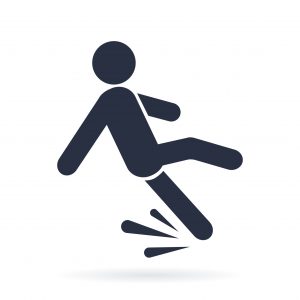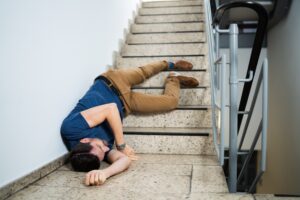When Could You Make A Public Liability Claim If There Were No Wet Floor Signs Displayed?
By Stephen Moreau. Last Updated 12th March 2024. Our guide explains when you could make a public liability claim if you suffered an accident after no wet floor signs were displayed in a public place.
Firstly, we set out the eligibility criteria that you will be expected to meet to claim for an accident in a public place, as well as the legislation which outlines the duty of care in these circumstances.

Additionally, we look at ways you could slip on a wet floor in a public place and what causes may be responsible for the injuries you sustain. Along with this, we also mention the evidence you could gather to prove fault in a slip and fall accident claim.
Moreover, our guide looks at how solicitors can consult a set of guidelines for assistance when valuing the harm you have suffered. We also distinguish between the types of compensation you may receive.
Furthermore, to close our guide, we explore how a No Win No Fee agreement usually works and what you can expect if a solicitor offers you such.
To find out more about when you could make a public liability claim if no wet floor signs were displayed, keep reading our guide.
Alternatively, to begin a discussion about your claim, you can reach our team of advisors, who can assess your claim and provide further guidance. To do so, please use a method below:
- Reach us on 020 3870 4868
- Fill out our web form and submit your details to contact us
- Look to our chat window to start a conversation
Select A Section
- I Was Injured In Public Because No Wet Floor Signs Were Displayed, Can I Claim?
- How Long Do I Have To Make A Claim?
- Evidence Supporting Claims Where No Wet Floor Signs Were Displayed
- Compensation Amounts For Slips And Falls On Wet Floors While Out In Public
- Could I Claim For A Slip On A Wet Floor With A No Win No Fee Solicitor?
- Find Out More About Claiming After No Wet Floor Signs Were Displayed
I Was Injured In Public Because No Wet Floor Signs Were Displayed, Can I Claim?
When you are in a public area, the controller of that space owes you a duty of care, as established by the Occupiers’ Liability Act 1957. Under their duty, the controller of the public space should take steps to ensure your reasonable safety while you’re visiting it. These steps can include identifying any hazards in the area, such as spillages, placing wet floor signs by any spillages found and clearing up hazards when possible.
If you do have an accident because there was no wet floor sign, and an injury occurs as a result, then you may be eligible to claim personal injury compensation. Your potential case will need to establish that:
- You were owed a duty of care.
- The party that owed you the duty of care breached it.
- And you were injured as a direct result of this breach.
For more advice on your eligibility to start a personal injury claim after slipping on a wet floor with no sign, contact our advisors for free either online or by calling us today.
How Long Do I Have To Make A Claim?
If you want to make a personal injury claim after slipping on a wet floor with no sign displayed, as well as meeting the eligibility requirements, it’s important to start your claim within the necessary time limit. This is generally three years, according to the Limitation Act 1980.
However, those under the age of eighteen cannot claim for themselves. A claim can be made on their behalf by a litigation friend at any time up until their eighteenth birthday. At this point, the time limit comes into effect, giving them three years to start a claim for themselves.
Additionally, the time limit does not apply to those who lack the mental capacity to make a claim for themselves. In these cases, a litigation friend can apply to make the claim on their behalf. If they recover the capacity needed and no claim has been made, they will have three years from the date of their recovery.
To learn more about the time limits involved in making a slip and fall claim, get in touch with our team of helpful advisors.
Evidence Supporting Claims Where No Wet Floor Signs Were Displayed
If you have suffered a slip, trip, or fall in a public place because no wet floor signs were displayed, you could be eligible to claim compensation for your injuries. Being able to establish liability for your accident will be important, and evidence can help to do so.
Examples of evidence which can be useful in proving liability include:
- CCTV footage and photographs of your injuries and the site of the accident.
- Copies of medical records
- A diary illustrating your symptoms and the mental impact of the injury.
- Witness contact information can help in relation to having the perspectives of other people who saw the accident. They could support your claim.
A solicitor from our panel can assist in gathering these forms of evidence.
Compensation Amounts For Slips And Falls On Wet Floors While Out In Public
There are two kinds of damages that make up the settlement in a successful personal injury claim.
In this section, we focus on general damages. The purpose of this award is to compensate you for the pain and suffering you have experienced due to your injury. Your harm will be valued by legal professionals who may consult the compensation brackets provided by the Judicial College Guidelines.
Examples of the figures contained within this document are in the table in this section. However, these may not represent the compensation you will receive. Each and every personal injury claim are unique to the person therefore, your circumstances will be reflected in the amount you receive.
The table is for guidance only.
Compensation Guidelines
| Injury | Severity | Details | Guidelines For Compensation |
|---|---|---|---|
| Multiple Severe Injuries + Special Damages | Severe | Multiple severe injuries alongside financial losses, such as the cost of travel or lost earnings. | Up to £500,000+ |
| Knee | Severe (a) (i) | Serious injury caused by a disrupted joint. There is gross ligamentous damage and considerable pain. | £85,100 to £117,410 |
| Head | Moderate (c) (iii) | Concentration and memory are impacted and there is a reduced ability to work. Dependence on others is limited. | £52,550 to £110,720 |
| Head | Less Severe (d) | There has been a good recovery made and a return of a normal social life. Poor concentration and memory may persist. | £18,700 to £52,550 |
| Back | Severe (a) (iii) | Disc lesions or fractures of vertebral bodies. Soft tissue injuries leading to conditions that are chronic. Severe pain and discomfort. | £47,320 to £85,100 |
| Neck | Severe (a) (iii) | Fractures or dislocations. Severe damage to soft tissue leading to disabilities that are significant and permanent. | £55,500 to £68,330 |
| Arm | Less Severe (c) | Disabilities have been significant but the recovery has largely taken place or is expected to. | £23,430 to £47,810 |
| Leg | Less Serious (c) (i) | The recovery from the fractures are reasonable but incomplete, however mobility remains impaired and there is sensory loss and discomfort. | £21,920 to £33,880 |
| Ankle | Moderate (c) | Ligamentous tears and fractures causing less serious disabilities. There may be difficulty walking on uneven ground or up stairs. | £16,770 to £32,450 |
| Shoulder | Moderate (c) | Shoulder is frozen and the movement is limited and accompanied by discomfort. | £9,630 to £15,580 |
Is Compensation Awarded For Costs And Losses?
You may also receive special damages. These are responsible for reimbursing you for financial damage you have suffered due to your injuries.
For example, if you require professional care as a result of the injury, you could receive damages for the money you spent paying for such.
As well as this, if you pay for home adjustments to accommodate your injuries, such as a stair lift or ramp, you could receive compensation for the financial losses you have experienced due to this.
Additionally, if you are temporarily unable to return to work or if you are unlikely to be able to work for the foreseeable future, you could suffer a loss of earnings.
Payslips, bank statements, and invoices can act as evidence of these monetary losses.

Could I Claim For A Slip On A Wet Floor With A No Win No Fee Solicitor?
A solicitor could propose to work on a No Win No Fee basis if you choose to seek their services. A Conditional Fee Agreement is a popular kind of this arrangement and may be put forward.
Usually, you can expect these to work in a way which means that the payment of your solicitor is dependent on the success of your claim.
So, if your claim is not a success, you will not typically pay for the services which your solicitor has provided.
However, if your claim is successful, your solicitor could take a success fee. This is when solicitors deduct an amount from the award you receive for your personal injury claim.
The Conditional Fee Agreements Order 2013 is in place to restrict the percentage that solicitors take as their fee. It is likely that you will have discussed this with your solicitor beforehand.
Contact Us
If you have slipped in a public place and suffered an injury because no wet floor signs were displayed, you could be eligible to start a claim
To speak in further detail about the circumstances of your claim, please contact our team:
- Call us on 020 3870 4868
- Claim online through our details form
- Refer to our chat feature for a live discussion
Find Out More About Claiming After No Wet Floor Signs Were Displayed
Thank you for reading our guide on when you could make a claim if you have suffered an injury in a public place after no wet floor signs were displayed.
For more information:
- How Much Are Slip And Fall At Work Settlements Worth?
- Hip Fracture Compensation Claims In The UK
- Broken Back Compensation Claims In The UK
For external websites:
- Slip Risks On A Supermarket’s Smooth Floor – HSE
- Head Injury And Concussion – NHS
- Statutory Sick Pay – Government Guidance



